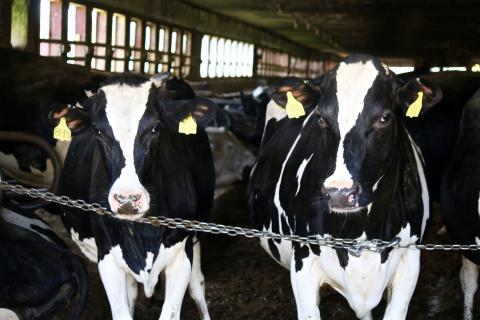New Hampshire Dairy Industry Adapts, Faces Challenges According to Updated Dairy Book

With New Hampshire’s dairy industry at risk from the cost of production exceeding farm income for a prolonged period, and new challenges from the COVID-19 pandemic that has roiled supply chains and demand, a new report provides critical updates on the state of the industry. The report, published as an addendum to a 2007 book, The History and Economics of the Dairy Industry, has been made available as a stand-alone publication and as a supplement to the original book, and is expected to be a valuable resource for decision and policy makers. While the report focuses on New Hampshire, report co-author John Porter notes that “it reflects the New England region”.
The book, originally written by UNH Extension emeritus professor and specialist John Porter, was updated in 2020 by Porter and UNH Extension emeritus professor Michael Sciabarrasi with support from Granite State Dairy Promotion. UNH professors and Chuck Metcalf from the NH Department of Health and Human Services Dairy Sanitation Program, contributed to the new report.
“UNH Extension is mailing courtesy copies to every dairy farm in the state”, says Amy Papineau, food and agriculture program team leader for UNH Cooperative Extension. “This report reflects the significant challenges facing the industry and how UNH researchers and educators are working with dairy farms to increase incomes and lower costs”, explains Papineau.
Much of the data described in the report were generated by UNH scientists in the College of Life Sciences and Agriculture conducting research as part of their New Hampshire Agricultural Experiment Station research programs. Trials were managed at the Fairchild Dairy Research and Teaching Center as well as at the more recently developed Burley-Demeritt Organic Dairy Research Farm. The globally and locally impactful research in recent years on nutrition and other topics has helped New Hampshire dairy farmers control costs and produce better products. The report details costs of milk production, which from 2015-2019 ranged from $1.88 to 2.10 per gallon whereas the price received was $1.46- 1.65 per gallon.
“A lot has changed in the New Hampshire dairy industry in recent months. The global surplus of milk, high input costs, and more recently COVID-19 have made tight margins for dairy farmers”, notes author John Porter, also the co-author of Preserving Old Barns, which was recently updated in 2019. The report explores the impact of the COVID-19 pandemic on New Hampshire’s dairy industry, and creative and collaborative adaptations the industry has employed to navigate the challenges of volatile demand and strained supply chains.
The report also highlights the New Hampshire’s new Dairy Premium Program, which despite rollout challenges has the potential to positively impact the state’s dairy industry. Signed by Governor Sununu in August 2019, the New Hampshire Department of Agriculture is working to bring industry partners and retailers together, and roll out an advertising campaign. UNH research has found that most Granite Staters are willing to pay more for local milk to support local dairy farmers.
The publication, which is expected to draw significant interest from decision makers and industry, can be viewed online or ordered as a hard copy. To view the addendum online, visit nhdairypromo.org/nh-dairy-farms. To order a physical copy, make a check payable to Granite State Dairy Promotion - $5 for a copy of the addendum or $25 for the original dairy book with the updated addendum – and mail to John Porter, 41 River Road, Boscawen, NH 03303.
Since 1915, UNH Extension specialists have provided trusted, research-based information to give New Hampshire farmers, businesses and citizens the tools they need to succeed. By working in collaboration with county, state and federal governments, UNH Extension is at work in every New Hampshire county, making the state’s key industries stronger, developing vibrant communities and municipal leaders, fostering healthy families and an informed and engaged citizenry, and keeping the state’s natural resources healthy and productive.